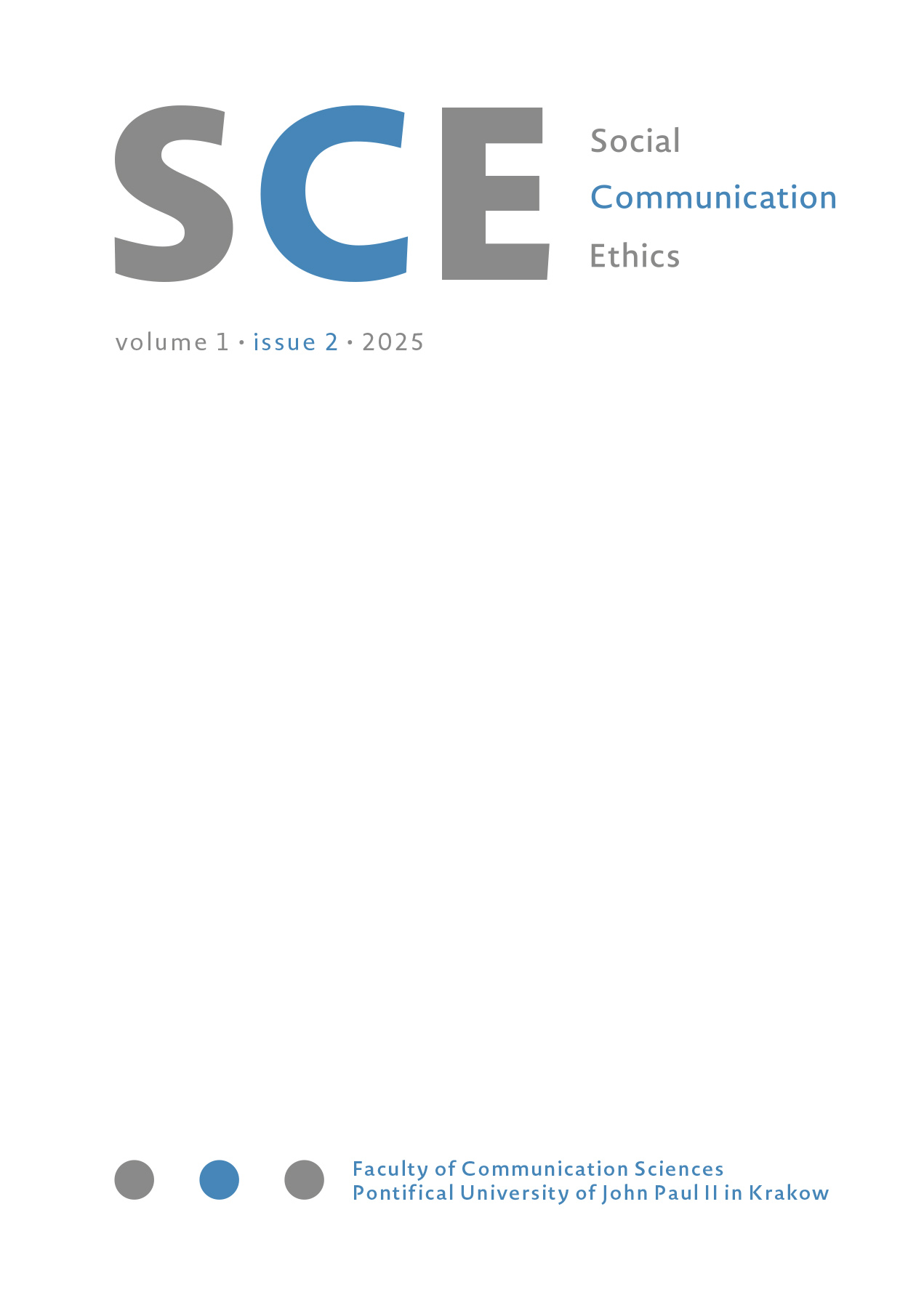The ideology of rashism as a basis forthe transformation of ethical principlesof journalism during wartime
DOI:
https://doi.org/10.15633/sce.01202Słowa kluczowe:
ethics, anti-ethics, propaganda, imperial ideology, rashismAbstrakt
The article examines the main basis of ethical dilemmas facing journalists in the context of Russia’s attack on Ukraine. A comparative analysis of the attitude to journalistic ethical principles of media workers in the two countries is made. The modern standards of Ukrainian journalists are highlighted, which are based on the Code of Ethics of a Ukrainian Journalist (2013 edition) and the regulatory recommendations of the Commission on Journalistic Ethics (2022). The systematic departure from the Code of Ethical Standards of Russian journalists and their involvement and service to the state propaganda machine are also analyzed. This article uses a combination of research methods, including comparative content analysis of Ukrainian and Russian journalistic practices, discourse analysis of selected media materials, and normative analysis of the codes of journalistic ethics in both countries, and documented case studies of media behavior since the beginning of Russia’s full-scale invasion of Ukraine in 2022. This normative-comparative framework makes it possible to identify key ethical principles, examine their (non)application in practice, and highlight the ideological forces that shape wartime journalism in both countries. This should not only cause indignation in the world community of journalists and their complete exclusion from the media field and a ban on any participation in covering events abroad. A brief history and reasons for the ethical decline of Russian journalism are given. The main types of violations of journalistic ethics in the Russian media are listed. In addition to the strong pressure on freedom of speech, the weakening of ethical norms is caused by the involvement of journalists in imperial ideas. It is determined that society and journalists as a part of it largely agree with the ideas of the government. The main reason for the service of Russian journalism to the political regime today is the ideology of rashism, which gives the Russian people a “special civilizational mission,” deprives the enemy of human features, and puts propaganda in the place of truth. It is concluded that Russian journalists not only violate ethical norms but also, in cooperation with the regime and the Russian Orthodox Church, become co-creators of a new type of propaganda based on the ideology of rashism. Ukrainian researchers emphasize the concept of “ethical man,” which should be the first place for a journalist and every citizen during war. The behavior of Russian journalists in the conditions of Russia’s attack on Ukraine is called the cultivation of anti-ethics at the cost of human lives. The author calls such activities genocide against the Ukrainians. The consequences of the main violations are incitement of hostility and the treatment of the Ukrainian military and civilian population as subhuman, the consequences of which are torture and brutal murders. Rashism is called the reason for the transformation of the ethical principles of journalists on both warring sides, the ideology that leads to war, forces Ukrainian journalists to create principles of self-regulation for new circumstances based on the Code of Ethics, and for Russian journalists become the reason for the rejection of the ethical tenets.
Bibliografia
Białek-Szwed, O. (2020). Mowa nienawiści problemem etycznym współczesnych mediów. Zeszyty Naukowe Katolickiego Uniwersytetu Lubelskiego Jana Pawła II, 61(4), 331–342. https://doi.org/10.31743/zn.2018.61.4.331-342
Džanpoladova, N. (2016, June 10). Žurnalìsti rosìjs’kogo NTV zajmaût’sâ «propagandists’kimbandi». https://www.radiosvoboda.org/a/27791059.html
Doroš, Ì. (2014, August 8). Žurnalìsti v Zonìato. Praktičnij poradnik. Detektor Medìa. https://ms.detector.media/how-to/post/11543/2014-08-08-zhurnalisty-v-zoni-ato-praktychnyy-poradnyk/
Drożdż, M., & Drąg, K. (2018). Etyka mediów — utopia czy powinność. Wydawnictwo Diecezji Tarnowskiej Biblos.
Hado, N. (2022). Rosyjska propaganda religijna podczas wojny w Ukrainie: historia powstania i mechanizmy oddziaływania. Media i Społeczeństwo, 18, 44–50.
Hado, N. (2023). Koncepcja raszyzmu we współczesnym znaczeniu z uwzględnieniem przesłanek historycznych. Media i Społeczeństwo, 18, 54–62.
Kulâs, Ì. (2014, October 30). Standarti j etika žurnalìstiki v umovah neogološenoï vìjni. Detektor Media. https://ms.detector.media/profstandarti/post/11691/2014-10-30-standarty-y-etyka-zhurnalistyky-v-umovakh-neogoloshenoi-viyny/
Kuz’menko, L., Kusˆ, L., Dvorovij, M., & Pogorelov, O. (2023). Samoregulâcìâ ukraïns’kihmedìa pìdčas dìï voênnogo stanu v Ukraïnì. Zdosvìdu roboti Komìsìï z žurnalìsts’koï etiki: Analìtično-dovìdk
Mìn’ûst RF ogolosiv «ìnoagentami» p`ât’ohžurnalìstìv, zokrema, veduču «Nastoâsˆego vremeni» Romalìjs’ku (2025, January 17). Radìosvoboda. https://www.radiosvoboda.org/a/news-romal%C3%ADyska-nastoyashcheye-vremya-%C3%ADnoagent/33279614.html
Mostovij, V.P., & Rìzun, V.V. (2014). Žurnalìsts’ka etika. Posìbnik dlâ pìdgotovki doderžavnogo ìspitu. ZNUA.
Mova ì vìjna: dinamìka movnoï sistemi ì movna polìtika. (2024). Vidavničij dìm Dmitra Burago.
Petrenko, S., & Babelnik, V. (2023) Monitoring the propaganda methods of the third reich in the info space of Ukraine and Russia. Integrated communications, 15(1), 86–94. https://doi.org/10.28925/2524-2644.2023.1511
Robota Komìsìïz žurnalìsts’koï etiki na tlì vìjni v Ukraïnì: pìdsumki 2022 roku (2022, December 28). Komìsìâ z žurnalìsts’koï etiki. https://cje.org.ua/news/robota-komisii-z-zhurnalistskoi-etyky-na-tli-povnomasshtabnoi-viyny-strong-v-ukraini-pidsumky-2022-roku-strong/
Skìl’kigrošej rosìâ vitračaê na fìnansuvannâ deržavnoï propagandi (2024,10 žovtnâ). Slovo ì Dìlo. https://www.slovoidilo.ua/2024/10/10/infografika/finansy/skilky-hroshej-rosiya-vytrachaye-finansuvannya-derzhavnoyi-propahandy
Tolstov, Ì., & Moskvìn, Â. (2023). Etika v kontekstì mipu ì vìjni. Vìsnik Harkìvs’kogonacìonal’no unìversitetuìmenì V. N. Karazìna. Serìâ Fìlosofìâ. Fìlosofs’kì peripetìï, 69, 15–20.
Ukraïna za rìk pìdnâlasâ na 27 pozicìj urejtingu svobodi presi. (2023, 3 travnâ). Slovoì Dìlo. https://www.slovoidilo.ua/2023/05/03/novyna/suspilstvo/ukrayina-rik-pidnyalasya-27-pozyczij-rejtynhu-svobody-presy
Ukraina i projekt “ruskoho mira”. (2014). NISD.
Zwoliński, A. (2003). Wojna. Wybrane zagadnienia. Wydawnictwo WAM.
Zwoliński, A. (2024). W cieniu wojny w Ukrainie. Petrus.
Pobrania
Opublikowane
Numer
Dział
Licencja
Prawa autorskie (c) 2025 Nataliya Hado

Utwór dostępny jest na licencji Creative Commons Uznanie autorstwa 4.0 Międzynarodowe.
Autorzy publikujący w czasopiśmie udzielają jego wydawcy zgody o następującej treści:
- Autor zachowuje autorskie prawa majątkowe do utworu, a jednocześnie udziela wydawcy czasopisma zgody na jego pierwszą publikację w wersji drukowanej i wersji online na licencji Creative Commons Uznanie autorstwa 4.0 Międzynarodowe oraz zgody na wykonywanie opracowań, w tym przekładów.
- Autor ma możliwość udzielania zgody niewyłącznej na opublikowanie utworu w wersji, która ukazała się w czasopiśmie (np. zamieszczenia go w repozytorium instytucjonalnym lub opublikowania w książce), wraz z informacją o jego pierwszej publikacji w czasopiśmie.
- Autor może umieścić swój utwór online (np. w repozytorium instytucjonalnym lub na swojej stronie internetowej) jeszcze przed zgłoszeniem utworu do czasopisma.

